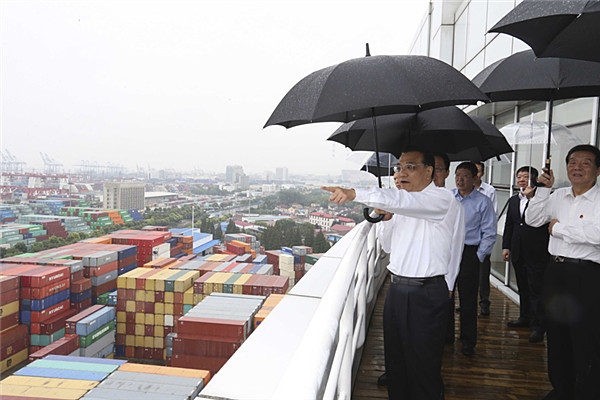
Premier Li Keqiang makes an inspection tour at Shanghai Pilot Free Trade Zone on September 19, 2014.[Photo/Xinhua]
A cluster of 26 cities in Yangtze River Delta region, including Shanghai, Jiangsu, Zhejiang and Anhui, will become pilots in future reforms, according to the State Council.
More than 30 years ago Guangdong province took the lead in reform and opening-up and now a new round of reforms need more “pilots”, Premier Li Keqiang said at the State Council executive meeting on May 11.
An outline aimed at building the city cluster in Yangtze River Delta region into a world-class one by 2030 was adopted at the meeting.
According to statistics, with only 211,700 square kilometers (2.2 percent of national territory area), the city cluster in the region has 150 million people (11 percent of national population) and generated 12.67 trillion yuan ($1.94 trillion) in 2014 (18.5 percent of national GDP).
Development based on reform and innovation will promote coordinated development of city cluster in Yangtze River Delta region, advance industrial upgrades, boost people-oriented urbanization, accelerate agricultural modernization, drive develop in peripheral and central and western regions, and strengthen national competitiveness, Premier Li said.
New pilots in reform and opening-up
“There are no preferential tax policies and financial support for Shanghai Pilot Free Trade Zone. What we will do is to promote further reform through streamlining administration and delegating power to lower-level government as well as system and mechanism innovation,” the Premier said.
“New highland” of reforms should be built to further develop the Yangtze River Delta region which, according to the Premier, can take a lead in initiatives such as business license reform and “smart city”.
“In future development, we cannot rely too much on natural resources. Instead, we should depend more on human resources which is the most active element in development,” Premier Li added.
The Premier added that efforts should be made to solicit foreign capital, attract international talents, open up service industries, and set up free trade ports.
New economies with mass entrepreneurship and innovation
City cluster of Yangtze River Delta region is one of the most dynamic, open, and innovative areas of the country. However, compared with other places, the region has no advantages in terms of natural resources.
It will be impossible for traditional economies in the region to keep high-speed growth and new economies should be developed with new development mode, the Premier noted.
“At Shanghai Pilot Free Trade Zone, I saw many enterprises featuring new industries and technologies. And e-commerce industry in Zhejiang province also has great influence across the nation.”
The Premier also stressed environment protection of Yangtze River Delta region, saying that taking a lead in environment protection will help promote development of city cluster, attract more intellectuals, forge stronger support for productivity development.
New highland of innovation
At the meeting Premier Li also said that a big view should be taken and development should be coordinated among cities of the Yangtze River Delta region.
Efforts should be made to break market barriers and build a big unified market in Yangtze River Delta region, the Premier added.
The development of city cluster of the region not only needs supports from central government but also needs mutual supports of other provinces and cities. And in this endeavor, Shanghai should play its role as the center city of the region and efforts should be made to promote integrated development in city cluster that includes Nanjing, Hangzhou, Hefei, Suzhou, Wuxi, Changzhou, and Ningbo.
“With dense population and local features, coordinated development in Yangtze River Delta region will have a demonstrative role across the nation. The region will be built into a new highland defined by innovation instead of preferential taxation,” the Premier said.
